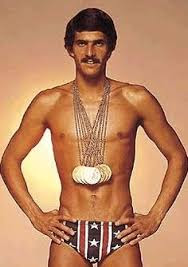Michael Phelps may have won three times more gold medals than Mark Spitz, but he still doesn't cut as dashing a figure as Mark did after amassing a 7-medal tally at Munich in 1972. For decades, this record stood until Michael won 8 gold medals at Beijing in 2008, adding to his previous 6 from Athens, and the 7 more he has won in Olympic Games since, making him the most decorated Olympian of all time.
Spitz had a total of 9 golds, including the 2 he had won previously in Mexico City, where he had promised to win 6 golds. Everyone was anxious to see if he would fulfill his promise in Munich, joining the 4x100 medley relay team at the last minute to win a total of 7 medals, all in world record times. Even that sparked a bit of a controversy as he bumped another American swimmer for that spot, with accusations that Spitz was being greedy. Just the same, the poster of Spitz sporting his 7 gold medals was even more popular than Burt Reynolds famous Cosmo centerfold from the same year. They bore more than a passing resemblance with their moustaches.
Whereas Spitz hung up his speedos after the '72 games, Phelps has swam in an unprecedented 4 Olympics, and who knows may still have it in him for one more. Bodies have changed considerably since 1972. Phelps towers over Spitz by 4 inches, giving him an impressive wing span that helped him regain the butterfly title from Chad de Clos yesterday, a full 7 seconds faster than Spitz in Munich. If nothing else, Phelps can switch to water polo.
There were some sour grapes when Phelps broke Spitz's record, but not as much as Michael Johnson, who seems notably upset by all the attention Usain Bolt has gotten over the years. Michael says he could take Usain if he was still in his prime. It would be a close race, as Bolt has only managed to shave 0.13 seconds off Johnson's 200 m time from 1996. Johnson still owns the world record in the 400, but Bolt doesn't race the 400 so we could only speculate on such a match up. It's tough to let go of those Olympic moments.
In many ways, Spitz paved the way for such Olympic superstars as there wasn't really anyone before who had capitalized as richly as he did off his success. Spitz credits his good looks as much as anything else for his fame. No one looks at a "magazine of uglies," as he put it. He also amusingly noted that he told a Russian coach his moustache helped reduce drag in the pool, and the next Olympics every Russian male swimmer and maybe a few females were sporting moustaches. Just pulling our leg, I imagine.


Comments
Post a Comment